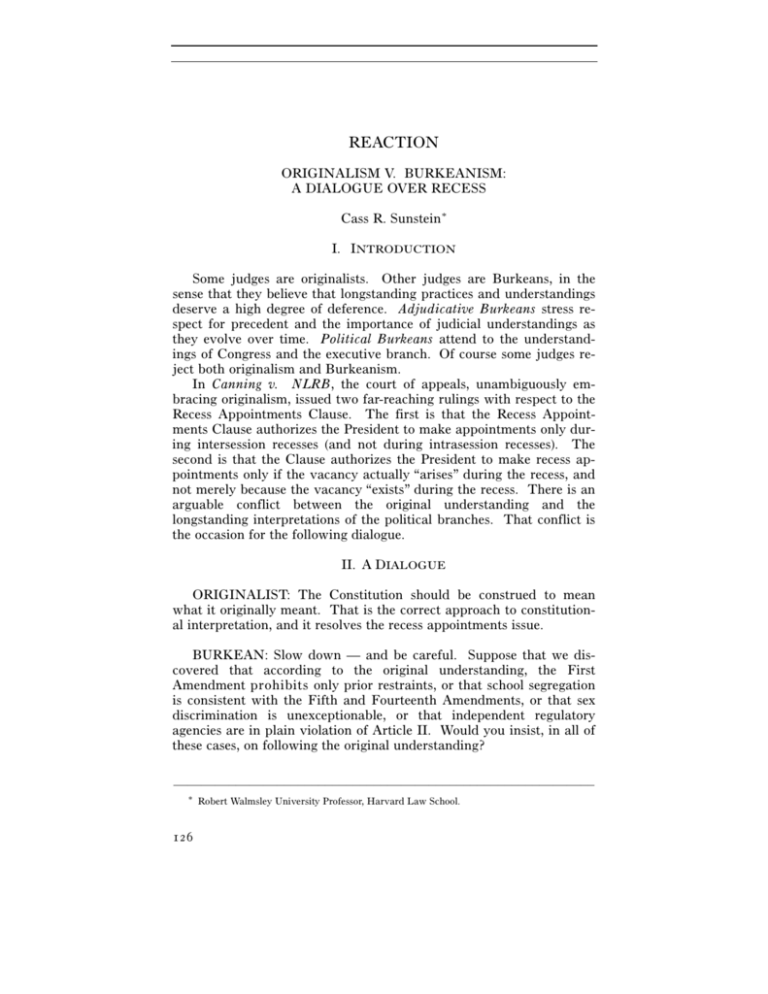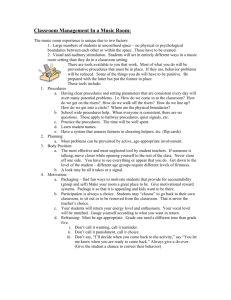ORIGINALISM V. BURKEANISM: A DIALOGUE OVER RECESS
advertisement

REACTION ORIGINALISM V. BURKEANISM: A DIALOGUE OVER RECESS Cass R. Sunstein * I. INTRODUCTION Some judges are originalists. Other judges are Burkeans, in the sense that they believe that longstanding practices and understandings deserve a high degree of deference. Adjudicative Burkeans stress respect for precedent and the importance of judicial understandings as they evolve over time. Political Burkeans attend to the understandings of Congress and the executive branch. Of course some judges reject both originalism and Burkeanism. In Canning v. NLRB, the court of appeals, unambiguously embracing originalism, issued two far-reaching rulings with respect to the Recess Appointments Clause. The first is that the Recess Appointments Clause authorizes the President to make appointments only during intersession recesses (and not during intrasession recesses). The second is that the Clause authorizes the President to make recess appointments only if the vacancy actually “arises” during the recess, and not merely because the vacancy “exists” during the recess. There is an arguable conflict between the original understanding and the longstanding interpretations of the political branches. That conflict is the occasion for the following dialogue. II. A DIALOGUE ORIGINALIST: The Constitution should be construed to mean what it originally meant. That is the correct approach to constitutional interpretation, and it resolves the recess appointments issue. BURKEAN: Slow down — and be careful. Suppose that we discovered that according to the original understanding, the First Amendment prohibits only prior restraints, or that school segregation is consistent with the Fifth and Fourteenth Amendments, or that sex discrimination is unexceptionable, or that independent regulatory agencies are in plain violation of Article II. Would you insist, in all of these cases, on following the original understanding? ––––––––––––––––––––––––––––––––––––––––––––––––––––––––––––– * 126 Robert Walmsley University Professor, Harvard Law School. 2013] ORIGINALISM V. BURKEANISM 127 ORIGINALIST: Because of the importance of stability in the law, I am willing to consider departing from the original understanding when two conditions are met: (1) judicial precedents are well entrenched and longstanding and (2) insistence on the original understanding would be highly disruptive to established practices and understandings. BURKEAN: Given your commitment to the original understanding, how can you justify that qualification? ORIGINALIST: Some originalists believe that the Constitution means what it originally meant, period — and that this principle requires judges to follow the original understanding no matter what. While I respect that position, I reject it. I am an originalist for reasons. I believe that originalism limits judicial discretion, promotes the rule of law, increases stability, reduces the risk of rule by unelected judges, and traces constitutional judgments directly to the views of We the People. The reasons that justify originalism may be overcome by countervailing considerations. Indeed, some approaches to constitutional law can be supported by many of the same arguments that justify originalism. In particular, respect for precedent limits judicial discretion, promotes the rule of law, and increases stability. BURKEAN: I am starting to understand your position, and I think that we might be able to agree on a great deal. Now let’s get to Canning. Unlike you, I am far from sure that the court of appeals was correct about the text and the original understanding. The court said that because the Constitution refers to “the Recess,” it necessarily contemplates that there is only one. It is possible, however, to precede a noun with the word “the” and not to understand the definite article to suggest “the one and only.” In ordinary language, a reference to “the car,” or “the ordinary American,” or “the horse” need not suggest that there is only one! Apart from the linguistic ambiguity, the “one and only” interpretation is severely complicated by the fact that intrasession recesses did not even occur until after the Civil War. We cannot know that “the” meant “the one and only” when intrasession recesses did not exist. In those circumstances, the original public meaning of “the Recess” is unclear. Perhaps the ratifiers would have agreed that “the Recess” includes any protracted period in which Congress is not in session. But my goal here is not to convince you that the Canning court was wrong in its interpretation of the original understanding. What I find extraordinary, and even incredible, is that the court was willing to adopt a contested understanding of the text to override very longstanding understandings on the part of the President and the Senate alike. In the case of the words “the Recess,” it rejected the shared understanding since 1921 — nearly a century ago. In its inter- 128 HARVARD LAW REVIEW FORUM [Vol. 126:126 pretation of “happen,” it rejected the shared understanding since 1823. We are speaking here of originalism as hubris — even as a kind of French Revolution, where judges, in the grip of an abstract theory, reject the longstanding practices of We the People. ORIGINALIST: Slow down — and be careful. In my view, the historical practices and understandings are a lot murkier than you suggest, and we do not have anything like a consensus, on the part of the President and the Senate, in support of either (1) appointments during intrasession recesses or (2) the “exist” interpretation of “happen.” But my goal here is not to convince you that you are wrong on those points. What puzzles me is the idea that the original understanding can be defeated, not by longstanding judicial interpretations of the Constitution, but by self-serving accommodations from Congress and the President. After all, the point of constitutional provisions is to protect the people, not to protect elected officials. Official mistakes — of constitutional magnitude, no less — cannot overcome the Constitution itself. BURKEAN: Recall what you said: if precedents are respected, we promote stability and the rule of law, and simultaneously cabin the discretion of judges. Judicial respect for longstanding political practices makes sense on exactly the same grounds. Indeed, the reasons for respecting those practices are more numerous, and stronger, than the reasons for respecting judicial judgments. We are speaking here of coordinate branches of government, which have made working accommodations for generations. Why should those accommodations, and the judgments that underlie them, receive less respect than the decisions of previous judges? ORIGINALIST: Fair enough. I can respect, and on reflection might even be able to endorse, the view that genuinely longstanding political arrangements can operate in the same way as precedents. But even if so, I did not say that precedents deserve respect merely because they are precedents. Overruling them must also be highly disruptive. What is the disruption here? BURKEAN: Longstanding practices deserve respect for two independent reasons. The first is that in general, practices persist because they work, and this point is particularly likely to hold when we are speaking of settled practices by the President and Congress. Consider the question whether under the Recess Appointments Clause, a vacancy must arise, or merely exist, during the recess. The decision of the court of appeals is obviously inconsistent with what many presidents have found necessary or appropriate (without significant opposition from, and arguably even with the agreement of, the Senate). Under 2013] ORIGINALISM V. BURKEANISM 129 contemporary conditions, both sides have found it legitimate for the President to fill vacancies when they exist during a recess. Something similar can be said about intrasession recesses. Of course there is an elephant in this particular room. The Senate has often been highly assertive in refusing to confirm presidential appointees, and the President has used recess appointments to counteract what he sees as its intransigence. To the extent that the branches have settled on certain accommodations, those accommodations deserve respect. And I cannot see how respect for those accommodations harms the people in any way. The second point is yours, and it involves disruption and instability. If courts reject longstanding practices, they may cause all sorts of ripple effects, which are likely to include unintended bad consequences and high costs. In this light, Canning itself raises two fundamental concerns. The first is backward looking: what happens to the rulings and decisions, made in the recent and not-so-recent past, by the NLRB and other agencies? The second is forward looking: what will be the consequences, going forward, of insisting on the court’s understandings of “recess” and “happen”? Might such an insistence not create all sorts of difficulties and problems, not readily seen by judges? ly? ORIGINALIST: So what would your preferred opinion say, exact- BURKEAN: It would begin by asserting the ambiguity of the text. It would continue by giving some account of the purposes of the Recess Appointments Clause — and of how those purposes argue, at least plausibly, for reading “the Recess” to include intrasession recesses and for reading “happen” to mean “exist.” It would then lean heavily on longstanding practices, documenting action by both executive and legislative branches. It would reconcile its reasoning with the holding in INS v. Chadha, suggesting that the historical record there was briefer and far more mixed (with respect to the considered views of the president). Might you be willing to join? ORIGINALIST: The real question, for me, is the nature and extent of the disruption. But I’ll consider it.






